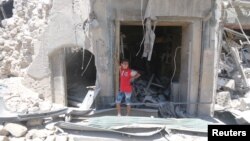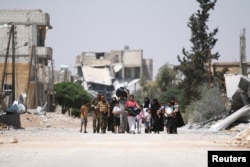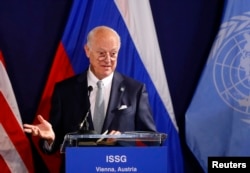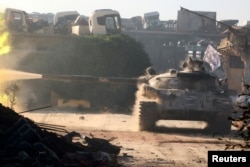Russia's Defense Ministry says it will halt firing around the Syrian city of Aleppo for three hours each day so humanitarian aid can be delivered to the ravaged city.
Russia made the announcement Wednesday, saying the "humanitarian windows" would run from 10 a.m. to 1 p.m. local time starting the following day. The cease-fire is to include aviation and artillery strikes.
The United Nations on Tuesday called for weekly breaks of 24 to 48 hours for delivery of humanitarian aid. When informed of Russia's announcement, U.N. humanitarian chief Stephen O'Brien said during a news conference that he "will look at any kind of suggestion which enables humanitarian aid to be delivered," but that addressing the volume of need in Aleppo will take a full 48 hours.
O'Brien's latest comments come one day after he said more than two million people in Aleppo have no access to running water or electricity.
"To meet that capacity of need, you need two [traffic] lanes and about 48 hours to get sufficient trucks in." He said truck convoys are more efficient than air drops for the amount of aid the civilians of Aleppo require. "Six weeks of air drops is the equivalent of one truck convoy, to Deir Ezzor for example. Purely practical matter."
Need for medical treatment
In addition to efficiency, he said people in need of urgent medical treatment must be evacuated, a process that will take multiple hours and safe access to roads.
O'Brien also noted on Tuesday that the United Nations has supplies "ready to roll" and can deliver them if given safe passage and a sufficient time window.
Attacks this week have severely damaged Aleppo’s electric and water infrastructure, while the main supply routes to both the eastern and western parts of the city have been cut in recent weeks, making an already severe humanitarian situation much worse.
O’Brien warned that the humanitarian situation across the country is dire. “Conditions across the rest of Syria are difficult and increasingly difficult,” he said.
U.S. General Sean MacFarland, the top commander for the coalition fighting Islamic State in Syria and Iraq, told reporters Wednesday that the humanitarian disaster in Aleppo is "a model of how I don't want to fight in Mosul [Iraq]."
"We want to conduct a campaign to liberate Mosul in a way that leaves the city largely intact and its people in good health," MacFarland said. "That does not seem to be the overriding consideration in the fight for Aleppo."
Political process in limbo
The U.N.’s Syria envoy, Staffan de Mistura, also briefed Security Council members Tuesday. In a private discussion held by video link, diplomats said de Mistura wants to restart the third round of intra-Syria talks as soon as possible, but that the right environment must exist.
De Mistura said last month that he hoped to resume the talks at the end of August; but, the escalation in Aleppo has cast doubt on that possibility, with several Western diplomats saying there could not be substantive negotiations without a stop to the fighting.
Russia’s U.N. envoy, Vitaly Churkin, said that while Moscow hopes the situation in Aleppo will improve, “we do not believe that there need to be any preconditions” for talks.
Fighting surges on
Meanwhile, the Syrian government has reportedly sent several thousand reinforcements to mount a counterattack south of Aleppo, in a bid to recapture territory taken by rebel factions in recent days.
Syrian state TV broadcast an urgent plea for volunteers, amid reports the army and its Lebanese Hezbollah allies were bringing in reinforcements to try to retake a strategic corridor south and west of the city.
Heavy fighting took place along Aleppo’s southern outskirts of Khan Assel, Khan Toman, Atareb and Sarmada, and there were reports of heavy government and Russian airstrikes of rebel forces defending a supply corridor into the city.
According to Syrian government media, the Syrian military and its militia allies stopped rebels from advancing through a destroyed housing complex south of the city, demolishing dozens of armed vehicles; however, Hilal Khashan, who teaches political science at the American University of Beirut, discounted any major advance by the government or rebels in Aleppo.
“I don’t believe that either side will prevail in the battle for Aleppo, despite the recent attack or the counterattack by government forces or their allies,” he said.
He argued that “a decisive victory by either party precludes the possibility for a negotiated settlement,” and said, “An equilibrium will need to be maintained, whereby all local allies will be losers and their regional and international backers will have to reach a negotiated settlement for the distribution of the spoils.”








